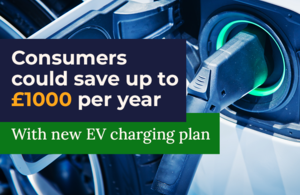The government shares new plan to set out steps for smart electric vehicle charging, including allowing motorists to power their homes using the electricity stored in their electric vehicle.
The Electric Vehicle Smart Charging Action Plan published the government and Ofgem, sets out steps being taken to seize on the significant potential of smart charging and make it the preferred method of long duration charging by 2025.
It could mean that electric vehicle drivers could save hundreds of pounds each year while cutting emissions by smarter charging of their electric vehicles.
The billpayers without electric vehicles will also benefit from a more sustainable, secure and efficient electricity system.
The projects, including a street lamppost capable of charging electric vehicles and selling power back to the grid, will receive a share of £16 million funding.
Graham Stuart, Energy and Climate Minister, said:
"We want to make smart charging an easier choice for drivers of electric vehicles, whether that is charging on the driveway, at the workplace, or parked on the street. To do that we need to build new network infrastructure at pace, using the latest available technologies.
"Today’s plan sets out how we will work with Ofgem and industry to kickstart the market for smart charging, which we are backing up with £16 million in innovation funding. This will let people take control of their energy usage, in the most convenient and low-cost way."
Director for Strategy and Decarbonisation, Ofgem, said:
"As energy regulator, we’re helping create the infrastructure to deliver Britain’s net zero future at the lowest cost to customers. This latest innovative plan will help to maximise the benefits of smart charging, offer vital savings to consumers and reduce the overall cost of energy by seizing the opportunities to use batteries to both power homes and fuel the wider grid."